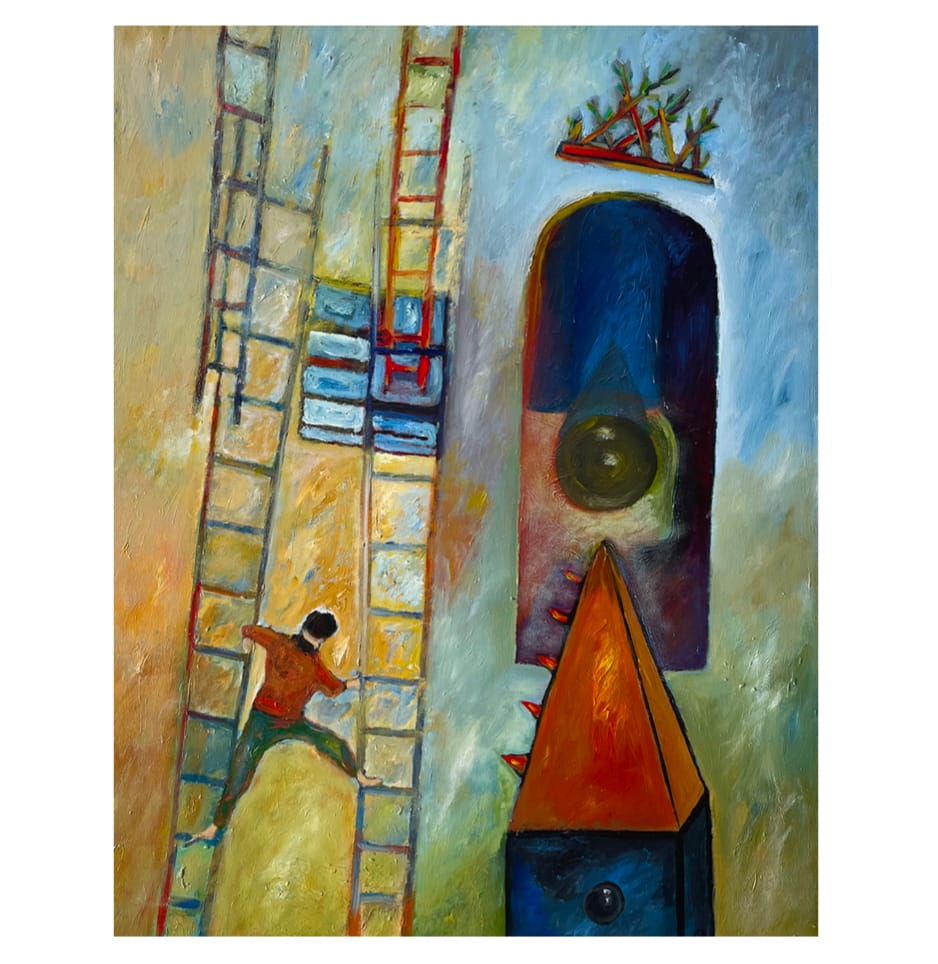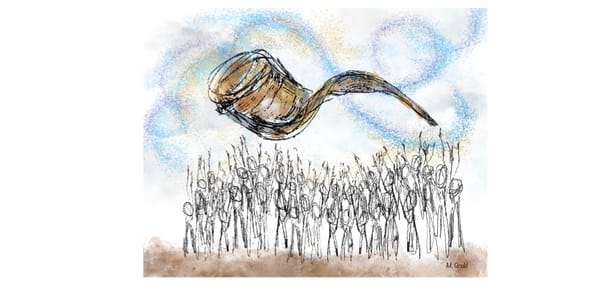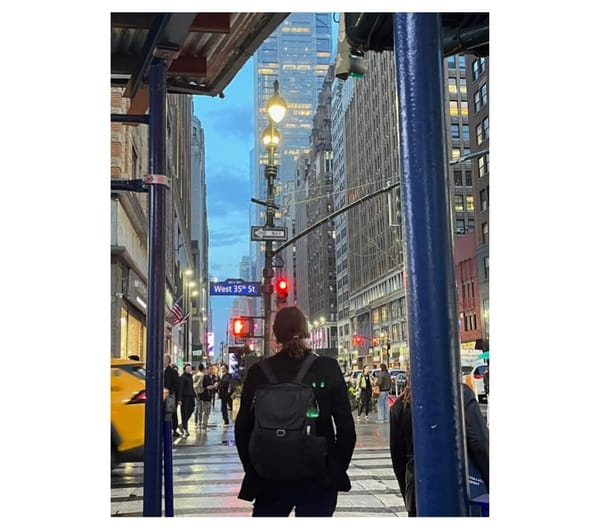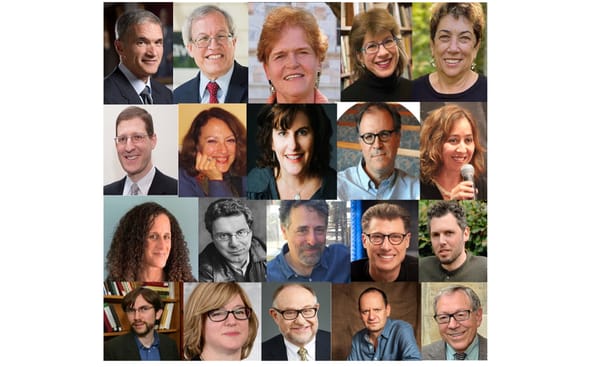"We Cannot Be Defined by the Hatred of Others," Antisemitism Here and Now

By Ellen Marks
April 22, 2025
It’s all of this and more: A Santa Fe student with a marker pen drawing swastikas on a young Jewish classmate. Rabbis answering the phone only to be called “genocidal baby-killer” and to hear death threats. A Jewish district attorney receiving threats credible enough to provoke state and federal action.
This is what antisemitism looks like in New Mexico, during a time when hate crimes are on the rise and local Jews are seeking ways to respond.
To some, the sense of safety in the United States has been shattered during the past few years, following synagogue violence in Pittsburgh, the Dallas area, southern California and elsewhere. Many have been feeling intensely vulnerable since Oct. 7, 2023 and the Hamas attack on Israel, with confusion about when — or even whether — criticism of the Israeli government becomes criticism of Jews in general.
And, most recently, people are feeling angry about the Trump administration citing antisemitism as the reason for cutting university funding and taking immigrants into custody under questionable legal means.
Those actions prompted 14 New Mexico rabbis to release an open letter recently, saying, “We object to the violation of anyone’s constitutional rights as a strategy for fighting antisemitism.”
Rabbi Neil Amswych of Temple Beth Shalom in Santa Fe, says, “There’s no question in my mind that in this country the social structures are not as safe as people assumed.”
“Everyone just assumes the world gets better, but that’s not written in the DNA of society. As a rabbi, I firmly believe … you have got to fight for it.”
For teens, these times can be especially fraught, particularly in places where there aren’t a lot of Jews and there is a perceived perception about how a Jewish person should think.
“It feels like things have to be very black and white,” says Lilith Ma’ayan, a 19-year-old who grew up in Albuquerque and attends Tufts University. “If I say I’m Jewish, they would assume you’re Zionist. But a lot of Jews are not happy with what’s going on, and I have compassion for both sides. Being the only Jew in the room … it’s a lot to put on a young Jewish person.”
Despite all that, some see a silver lining: It’s in difficult times that we reinforce our values, say Amswych and others.
“We have to stand strong as Jews and stand proud as Jews,” says Rabbi Berel Levertov of Santa Fe Jewish Center-Chabad. “I know that we felt in a certain bubble. We were accepted. There was no overt antisemitism. We had reached a place of equilibrium.”
Says Rabbi Amswych: ”When our values are challenged, when cruelty raises its head, we suddenly realize, ‘I can’t tolerate this.’ There can be hope in that.”
— The Numbers —
The latest figures from the Anti-Defamation League show there were 47 antisemitic incidents in New Mexico in 2024 — the highest recorded in the state since ADL began tracking such data in 1979. That compares to 31 incidents the previous year. The second-highest level on record was 42 incidents in 1992.
“Jews alone can’t stop the multifaceted hate targeting our communities,” says Juan Dircie, director of the Jewish Community Relations Coalition of New Mexico. “We need everyone to recognize antisemitism for the true threat it is not only to Jews, but to our entire society. All New Mexicans must push back against this hate.”
The New Mexico figures, broken down, show 41 incidents of anti-Jewish harassment and six vandalism incidents reported in 2024.
Nationwide, the ADL annual audit released on April 22 recorded 9,354 incidents of assault, harassment and vandalism last year — the most the ADL has ever recorded. It’s an increase of 5 percent over 2023, which was also a record-setting year.
For Rabbi Celia Surget in Albuquerque, a pressing issue is keeping her synagogue and worshippers safe at Congregation Albert. “I think saying we should be worried feels very unhelpful,” Surget says. “I think we need to be aware that antisemitism is on the rise and that we need to ensure that we are looking after our venues. You can be safe and you can be welcoming and you can be a kind of shelter from the world. Those are not mutually exclusive.”
Bernalillo County District Attorney Sam Bregman says he hasn’t seen a lot of antisemitic or hate crimes in general cross his desk in Albuquerque. “I’m grateful for that,” says Bregman, but adds, “I’m worried about the antisemitism in our country because it’s so prevalent — worldwide. You never know when someone is having a mental breakdown and taking their hate out on Jews.”
Attacks Coming from both the Left and Right
Rabbi Amswych sees a new dynamic at work when it comes to antisemitism, particularly after the Hamas attack on Israel and the responding war in Gaza.
“One of the big challenges of antisemitism in the moment as opposed to decades ago, was back then we knew where antisemitism was coming from,” Amswych says. “It was almost always coming from the political right. People are now concerned about rising antisemitism on the left.”
He quotes a comparison that he believes is particularly apt: “I heard somebody say that antisemitism on the right is like a heart attack, and antisemitism on the left is like cancer. On the right, it’s violent and you can prepare, but on the left, the cancer is insidious. It makes its way through society.” The difficulty is that “criticism of Israel is not necessarily antisemitic. But it can be,” he says.
Mordechai Liebling, a Philadelphia rabbi who has been attending conferences about antisemitism and speaking out about it, says another “relatively new phenomenon” is the move by President Donald Trump’s administration and “leading members of Congress to use antisemitism in order to seriously undermine academic freedom and the independence of major universities.”
“It’s a smokescreen that just further fuels hostility toward Jews,” says Liebling, a board member of the Faith and Politics Institute and Faith in Action.
“It makes me very angry,” says Jessica Goodkind, founding director of the Refugee and Immigrant Well-being Project at the University of New Mexico. “As Jewish people, we know what it means to be targeted and persecuted, so to persecute other people by taking away the right to free speech and protest is totally against Jewish values. People taking those actions don’t really care about Jewish people or antisemitism.”
Goodkind, a UNM sociology professor, finds that “conversations are so important right now,” but they differ depending on with whom she is speaking. With fellow Jews, she says, the focus is often on why criticism of the Israeli government is not the same as antisemitism. With non-Jews, she tries to cultivate an understanding of why many Jewish people may feel invested in having a safe homeland.
Still, ask someone who grew up outside the United States about antisemitism, and their outlook is strikingly different than those raised here.
“The whole experience with antisemitism in South America is very different than American experiences,” says Juan Dircie, the new director of the Jewish Community Relations Coalition.“The American Jewish story was so successful in terms of social development, professional development, economic development and political development that American Jews really felt they were completely and unquestionably accepted in American society,” he says. “They didn’t expect this post-Oct. 7 reaction.”
Dircie, who grew up in Argentina, recalls repeated bomb threats at his Jewish day school and an antisemitism that was sometimes unleashed by the government.
Rabbi Surget says she was aware of “latent antisemitism” in her homeland of Switzerland. “I grew up: always be aware.”
As for Rabbi Levertov, his childhood was spent in Brooklyn, N.Y., among “quite a bit” of anti-Jewish sentiment, as well as his Russian father’s experiences with an organization aimed at helping Russian Jewry. The truth, he says, is that Jews should never put their complete faith in a society that could turn on them at any time. “We never felt that comfortable to rely on society that everything is going to be fine,” Levertov says. “We didn’t live with constant fear but understood the false narrative that Jews are safe in society.”
What Should We Do?
Bregman, the district attorney, is quick to give his advice on dealing with antisemitism: “Report it. If we don’t know about it, we can't prosecute somebody for a hate crime,” he says. “If we don’t know about it, we can’t stop it.” The same goes for the threat of violence against family or friends, he says, including graffiti that is violent.
Rabbi Amswych has turned to education as a way of dealing with the antisemitism he has seen in Santa Fe schools — more as a private individual than necessarily representing his synagogue, he says. He tells of a Jewish student whose classmate showed a picture of ovens and asked which one he’d like to be in. Or the 7-year-old kid who was told by a classmate that they could no longer be friends because of Israeli actions in the Middle East. Or the marker pen incident involving swastikas.
Amswych has talked to students who have experienced such hatred, as well as principals and teachers at those schools. One middle school realized it had an issue with antisemitism, and invited the rabbi to speak. He held 10 assemblies so he could reach every student.
Dircie sees his new job at the JCRC-NM as a chance to promote the religion’s values and “create a more consistent and powerful Jewish voice statewide.” The coalition, formed after the Oct. 7 invasion, is planning educational opportunities for both Jews and non-Jews “who would like to learn more and get better educated at Judaism, our values, our connection to Israel and the fight against antisemitism,” Dircie says.
Emet Ma’ayan, Lilith’s father, says a strategic way to deal with the current moment is to join forces with others — not just within the Jewish community, but with outside groups as well. Ma’ayan recalls his congregation at Nahalat Shalom joining an interfaith vigil after then-President Donald Trump imposed a Muslim ban in 2017. The ties that resulted were so strong that this happened: a Palestinian woman insisted she be involved in talking to a business owner who had posted an antisemitic trope about his Jewish landlord.
“Emet, if they’re coming for you, they’re coming for us,” the woman told Ma’ayan. “There is no difference.”
Philadelphia Rabbi Liebling, who is the son of Holocaust survivors, also emphasizes the importance of joining forces with others, at this moment when the very nature of democracy in the United States is threatened. He says in the old days, in Europe, antisemitism was woven into the fabric as part of a widespread teaching that Jews killed Jesus. In those circumstances, Jews had no allies and often no choice but to placate those in power or face death.
Many U.S. Jews have inherited that mindset, he says, although these times are much different. It’s now possible for Jews to build alliances, particularly for the fundamental support of democracy, Liebling says. “Our well-being depends on the health of democracy, not the largesse of people in power,“ he says. “Jews and Judaism thrive best in a democracy.”
Rabbi Amswych says Jews must continue to gather in synagogues to be together and to pray together “because there is an essential human need for community.”
In fact, he says, “We can not be defined by the hatred of others. But we can use the hatred of others to understand how we define ourselves.”
Ellen Marks has been a journalist for more than four decades, including stints in Boise, Idaho, Seattle and Albuquerque. She came to the Albuquerque Journal in 1986 and retired from there six years ago, but continues to do regular assignments for the newspaper.
Gloria Abella Ballen is an artist and author creating award-winning books as well as working in other media, including painting, drawing, graphics, and silverwork. She is also co-founder of the Institute for Tolerance Studies.
About Jacob’s Ladder, Abella Ballen explained that it "refers to exile and the connection between heaven and earth. (In Pirkei De-Rabbi Eliezer 35:6-10, the ladder signified the 4 exiles the Jewish people would suffer before the coming of the Messiah. The Roman exile being the last.)" She added that it is "about struggle, connection and hope but, the viewer always brings nuances and understandings and reflections that are personal." https://www.abellaballen.com/



